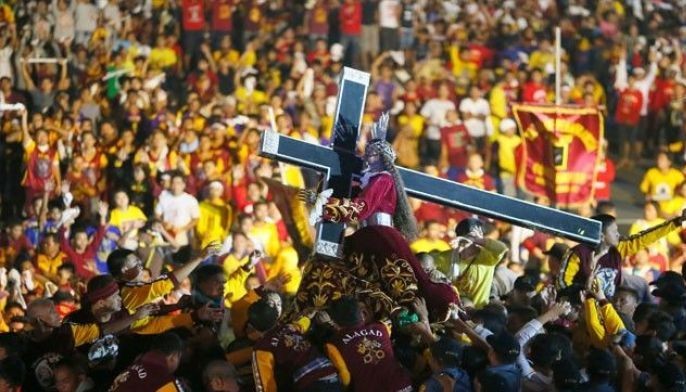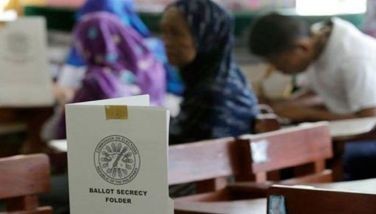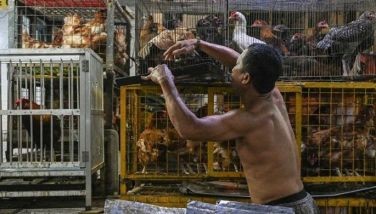For the 1st time in 20 years, Namfrel may not hold quick-count
October 24, 2003 | 12:00am
For the first time in 20 years, the National Movement for Free Elections (Namfrel) might not conduct its parallel and independent quick-count during a national election.
Jose Concepcion and Guillermo Luz, Namfrel chairman and secretary general, respectively, both expressed apprehension over the outcome of next year’s national elections as the Commission on Elections (Comelec) continues to defer action on their request for accreditation.
"With great pain, we are constrained to inform you that, as of yesterday, Namfrel has not been accredited to conduct its Operation Quick Count for the 2004 elections," Luz said.
He added that they applied for accreditation on Jan. 28. After over 10 months, the Comelec has yet to act on the Namfrel petition.
Namfrel said that on Sept. 2, the Comelec gave Namfrel the go-ahead to conduct public information campaigns, advocacy and report anomalies to the poll body.
However, the Comelec has remained silent on Namfrel’s Operation Quick Count and intent to check the potency of the indelible ink to mark voters’ fingers after they cast their ballots. In short, there is no guarantee that the Comelec will furnish Namfrel with the fourth copy of the election returns, which is the basis for the quick count.
Namfrel said that normally, if there is no opposition, they get their accreditation two months after filing a request and they cannot understand the reason for the delay.
Luz said there was no opposition during the Comelec hearings, nor did the poll body approve similar requests from other independent groups.
"This means the opposition must be coming from within (the Comelec)," he said.
Although Namfrel has had a falling out with Comelec Commissioner Luzviminda Tancangco — to the point of spearheading an impeachment petition against her before Congress — Luz said he doubts that the Comelec’s inaction on Namfrel’s request for accreditation for the 2004 elections was caused by just one commissioner.
The Comelec is composed of seven commissioners who, Luz said, should think and make their decisions individually.
"We are being denied access to raw data," Luz said. "Now, Namfrel is unable to make any preparations."
"After 20 years of working on elections, with our track record to handle counting and spot anomalies, we cannot figure out why they don’t want Namfrel in — unless they don’t want us to find more anomalies," Luz said.
Concepcion said he is praying for the intercession of the Holy Spirit on Namfrel’s behalf. He has also asked the Comelec to act on their request before the end of the month, otherwise, it would be too late for the poll watchdog to make preparations.
"It’s still possible that the Holy Spirit will descend upon the members of the Comelec, supported by the general public, and the accreditation of Namfrel (may) probably be given by the end of this month," Concepcion said.
Luz hinted at the possibility that Comelec might intentionally be holding back. "The design of their mind is that they would accredit us when we have no more time to prepare, when it would be to late."
He added that Namfrel "wanted the amount of time, that is why we filed (our request for accreditation) last January. If they would give us the accreditation at a late stage, it would be useless." Namfrel is also recommending that the Comelec extend the registration of new voters for another 120 days. The poll watchdog also advised the Comelec to beef up its information dissemination efforts to draw more new registrants.
If the voter registration process is properly implemented, Namfrel estimates that there will be about four million new voters — a number that excludes overseas Filipino voters.
The Comelec should also inform the public that while the voter registration process includes the processing of a Comelec-issued voter’s identification card, they can still vote even if they do not have the new, specialized ID yet. All each voter needs to do is present a valid ID as specified under the Omnibus Election Code, including passports, SSS IDs and valid driver’s licenses.
The Comelec ID was intended to purge the voter’s list of multiple registrants and disqualified voters.
Namfrel said a less expensive way of achieving this goal would be to post the Computerized Voter’s List in all barangay halls and Comelec offices.
Voters can check their names and precinct assignments well in advance from this list, Luz said.
Namfrel also said the Comelec should assure the public that the automated counting machines (ACMs) they will be using are "stand-alone" machines and are not connected to any device that could compromise security measures and affect the data and programs stored in the machines.
"In other words, any external connection (to the ACMs) can possibly lead to manipulation or alteration of the data or program. Any connection will also be illegal," Luz said.
Jose Concepcion and Guillermo Luz, Namfrel chairman and secretary general, respectively, both expressed apprehension over the outcome of next year’s national elections as the Commission on Elections (Comelec) continues to defer action on their request for accreditation.
"With great pain, we are constrained to inform you that, as of yesterday, Namfrel has not been accredited to conduct its Operation Quick Count for the 2004 elections," Luz said.
He added that they applied for accreditation on Jan. 28. After over 10 months, the Comelec has yet to act on the Namfrel petition.
Namfrel said that on Sept. 2, the Comelec gave Namfrel the go-ahead to conduct public information campaigns, advocacy and report anomalies to the poll body.
However, the Comelec has remained silent on Namfrel’s Operation Quick Count and intent to check the potency of the indelible ink to mark voters’ fingers after they cast their ballots. In short, there is no guarantee that the Comelec will furnish Namfrel with the fourth copy of the election returns, which is the basis for the quick count.
Namfrel said that normally, if there is no opposition, they get their accreditation two months after filing a request and they cannot understand the reason for the delay.
Luz said there was no opposition during the Comelec hearings, nor did the poll body approve similar requests from other independent groups.
"This means the opposition must be coming from within (the Comelec)," he said.
Although Namfrel has had a falling out with Comelec Commissioner Luzviminda Tancangco — to the point of spearheading an impeachment petition against her before Congress — Luz said he doubts that the Comelec’s inaction on Namfrel’s request for accreditation for the 2004 elections was caused by just one commissioner.
The Comelec is composed of seven commissioners who, Luz said, should think and make their decisions individually.
"We are being denied access to raw data," Luz said. "Now, Namfrel is unable to make any preparations."
"After 20 years of working on elections, with our track record to handle counting and spot anomalies, we cannot figure out why they don’t want Namfrel in — unless they don’t want us to find more anomalies," Luz said.
Concepcion said he is praying for the intercession of the Holy Spirit on Namfrel’s behalf. He has also asked the Comelec to act on their request before the end of the month, otherwise, it would be too late for the poll watchdog to make preparations.
"It’s still possible that the Holy Spirit will descend upon the members of the Comelec, supported by the general public, and the accreditation of Namfrel (may) probably be given by the end of this month," Concepcion said.
Luz hinted at the possibility that Comelec might intentionally be holding back. "The design of their mind is that they would accredit us when we have no more time to prepare, when it would be to late."
He added that Namfrel "wanted the amount of time, that is why we filed (our request for accreditation) last January. If they would give us the accreditation at a late stage, it would be useless." Namfrel is also recommending that the Comelec extend the registration of new voters for another 120 days. The poll watchdog also advised the Comelec to beef up its information dissemination efforts to draw more new registrants.
If the voter registration process is properly implemented, Namfrel estimates that there will be about four million new voters — a number that excludes overseas Filipino voters.
The Comelec should also inform the public that while the voter registration process includes the processing of a Comelec-issued voter’s identification card, they can still vote even if they do not have the new, specialized ID yet. All each voter needs to do is present a valid ID as specified under the Omnibus Election Code, including passports, SSS IDs and valid driver’s licenses.
The Comelec ID was intended to purge the voter’s list of multiple registrants and disqualified voters.
Namfrel said a less expensive way of achieving this goal would be to post the Computerized Voter’s List in all barangay halls and Comelec offices.
Voters can check their names and precinct assignments well in advance from this list, Luz said.
Namfrel also said the Comelec should assure the public that the automated counting machines (ACMs) they will be using are "stand-alone" machines and are not connected to any device that could compromise security measures and affect the data and programs stored in the machines.
"In other words, any external connection (to the ACMs) can possibly lead to manipulation or alteration of the data or program. Any connection will also be illegal," Luz said.
BrandSpace Articles
<
>
- Latest
- Trending
Trending
Latest
Trending
Latest
Recommended





























